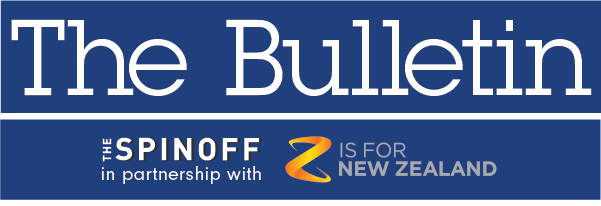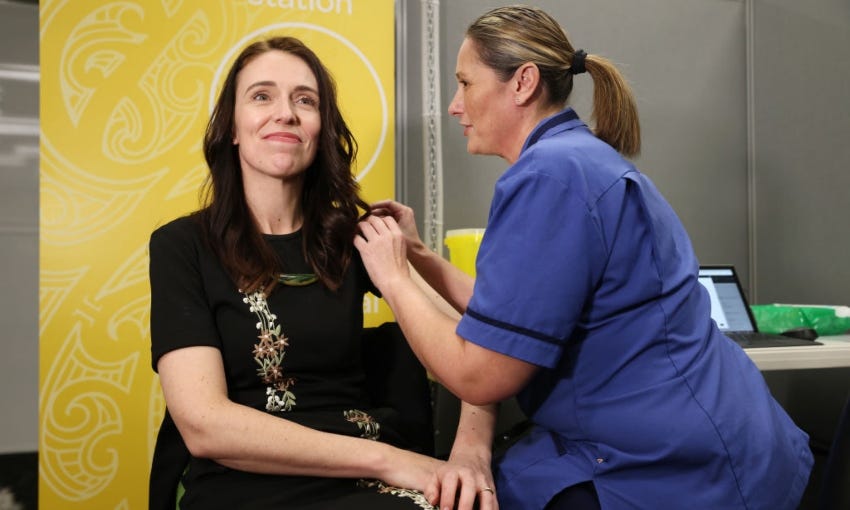Vaccine rollout enters new phase
The next few months will be crucial for New Zealand's ability to withstand an outbreak
Good morning and welcome to The Bulletin for Thursday 29 July, by Alex Braae for The Spinoff. Presented in partnership with Z Energy.
In today’s edition: Vaccine rollout enters new phase, Pharmac opens up priority lists to public scrutiny, and Commerce Commission to release study into supermarkets.
Image: PM Ardern getting her second dose of the vaccine, at an event in Hamilton (Getty Images)
The vaccination programme has moved into a new phase. Our live updates at 1.00pm reported that those age 60 and up can now book an appointment here, with further age brackets being rolled out over the coming months. About 700,000 people are now fully vaccinated, with the rate now intended to speed up.
It comes at a time when only a small proportion of group three have been fully vaccinated, reports Michael Neilson for the NZ Herald. That has led to concerns from health expert Dr Rawiri Jansen that it would be better to hold off on group four until a greater share of a vulnerable population has been vaccinated. "They need to taihoa. Supply was challenging for a while and they needed to build up capacity before being able to ramp up," said Dr Jansen.
PM Ardern said geographic availability might affect when people can book. For example, those living on Rakiura/Stewart Island are in the process of a pair of vaccination days, reports Radio NZ, along with many other small communities doing the vaccinations en masse. At the other end of the scale a mass vaccination event in Auckland has now been booked out, after initially failing to get a particularly good uptake, which local councillor Efeso Collins said reflected a communications failure. Stuff's Hannah Martin has an explainer on the Manukau mass-vax event – the first of its kind.
It can be difficult to put in context the effects of mass vaccination, but in some countries it may be having an impact. About 70% of the UK has had one dose, and more than half are fully vaccinated. Case numbers are still wildly high – tens of thousands of new cases every day. But there hasn't been a corresponding spike in death, and a few weeks ago the Guardian reported on a study that suggested 30,000 deaths had been prevented as a result of the rollout. But dozens of deaths a day are still being reported, and even outside that the symptoms of "Long-Covid" can last for months, and perhaps longer. In short, mass vaccination significantly limits the damage, but doesn't stop it altogether. Meanwhile, CNN reports new data suggests that a third dose of the Pfizer vaccine might be needed to offer truly comprehensive protection against the delta variant.
Pharmac is opening up the priority lists for medicines it seeks to fund, in a bid to be more transparent. The NZ Herald reports it comes after criticism from patients that funding decisions are too opaque, and some aspects have continued to be kept under wraps for commercial sensitivity reasons. On the subject of Pharmac, the NZ Herald's (paywalled) Matt Nippert has come out with a majestic feature this morning, looking into the overall model and whether it is still fit for purpose.
Today's the big day for the Commerce Commission market study into supermarkets, and there could be some fireworks. A report from Stuff's Tom Pullar-Strecker indicates there is severe tension between suppliers and the supermarkets, who can wield immense power over those suppliers' livelihoods. It bounces off comments made by Katherine Rich of the Food & Grocery Council, who accused supermarkets of making "extreme demands" and threats against suppliers. From the consumer side of it, this opinion piece on Stuff by Daniel Dunkley gives a good outline of how arguably non-competitive the market is in New Zealand compared to other countries, and what that means for prices.
We’re hard at work. But we can’t do this without the support of our members. Support our mission to do more by donating today.
The Pop-Up Globe was one of the brightest stars in the New Zealand theatre industry, achieving a remarkable and unlikely level of success. Then Covid hit, and it was a casualty. But as this feature on The Spinoff from Adam Goodall outlines in remarkable detail, the money problems started quite a bit before the pandemic, which left the Globe vulnerable right when they were planning to spread their wings overseas.
A tentative new date has been given for the Auckland port automation project to come online – March next year. The NZ Herald's (paywalled) Andrea Fox reports that's subject to change if getting there will jeopardise the movement of goods through the port. Dividends from the port have been falling recently, and Auckland councillors appear to be getting fed up with the delays.
Following on from yesterday's Bulletin about nitrate levels in water, this is an excellent and exhaustive analysis of it all. Unfortunately the piece by Radio NZ's Farah Hancock came out about an hour after my deadline, but I'd strongly encourage a read of it for a more complete picture.
Got some feedback about The Bulletin, or anything in the news?
Get in touch with me at thebulletin@thespinoff.co.nz
Right now on The Spinoff: Tava Olsen writes about the unfairness in the MIQ system, and how it could be changed. Josie Adams meets some local bitcoin miners, who defend their profession and the environmental impact of it. Maddy King writes about how women can thrive in male-dominated workforces. Charlotte Muru-Lanning meets artist Chloe Smith, who meticulously crafts food out of felt. And pop duo Laiika appear on the latest episode of First, talking about the moments that changed their lives.
And we're hiring: The Spinoff Group is looking for an HR specialist, to help out with the rapid growth tear the organisation has been on recently. I can personally attest that whoever takes on the job will get to work with an amiable bunch of lovelies. Applications close August 16.
For a feature today, a thought provoking look at a potential outcome of the Marsden Pt oil refinery closing down. Writing on Newsroom, Sustainability Council executive director Simon Terry argues that it could leave the country catastrophically vulnerable to supply shocks, which could lead to basically everything grinding to a halt in a matter of weeks. Here's an excerpt:
The risk situation is not just the classical one of an outbreak of hostilities that blocks key shipping lanes. It is the extreme vulnerability New Zealand would face should any foreign agent exercise strategic power in a bid to gain something New Zealand would not otherwise offer. That agent need only frighten maritime insurers enough to deter oil tankers from travelling to New Zealand in order to have the nation over a barrel.
‘Waiting it out’ is not going to work against such a strategic threat if the country has only stocks. And while New Zealand has coastal tankers of its own, a refinery closedown is expected to involve getting rid of these ships as well. The extent to which New Zealand could or should rely on other countries to rescue it becomes a critical question.
Fiji got a gold medal yesterday and it clearly meant the world to the players. The Guardian reported Fiji's win over New Zealand came for a team that had made immense sacrifices to be at the games, with players not having seen their families since Easter. They had to take a cargo plane just to get to Japan too. Incredible work from deserved champions.
And in other stuff from yesterday: Hannah Osbourne and Brooke Donoghue rowed to a silver medal, claiming what seems to be a rare medal so far. I enjoyed reading this from Newshub, about how we shouldn't "panic" about the relatively low medal tally – I'm personally not sure if panic is the word that comes to mind when I think anything at all about the medal table. Besides, we're all but guaranteed another gold now that the Oly Whites are through to the quarterfinals in the football.
That's it for The Bulletin. If you want to support the work we do at The Spinoff, please check out our membership programme.







